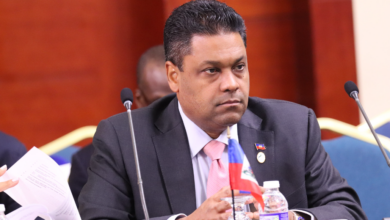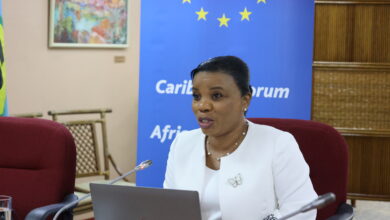Her Excellency Daniela Tramacere, Head of EU Delegation, Barbados, and Ambassador Accredited to CARICOM;
Captain Errington Shurland, Executive Director of the Regional Security System;
Mr Francis McBarnette, OAS Representative in Barbados;
Mr Wilmot St Cyr, thanks for your moving testimonial and yes a life of crime is not worth it;
Ms Germania Melo Velazquez Representative of Consejo Nacional de Drogas of the Dominican Republic;
Ms Myrna Bernard Director Human and Social Development at the CARICOM Secretariat;
Other Representatives of Various Partner Organisations;
Special Invitees;
Ladies and Gentlemen.
It is my pleasure to be here this morning to participate in the launch of the 10th EDF CARIFORUM Crime and Security Co-operation Programme. This is a very important and timely programme for all the reasons that you have heard before this morning.
Being here at this base also gives me the opportunity to thank Captain Shurland and the Regional Security System (RSS), for the valuable contribution to the relief and recovery efforts following the passage of Hurricanes Irma and Maria last September in collaboration with the Caribbean Disaster Emergency Management Agency (CDEMA). The RSS, went beyond the boundary of its membership and the support that it rendered in the hour of need will not be forgotten.
That commitment to the task is a feature of this multi-faceted organization, the RSS, which is playing a significant role in the crime and security structure of our Region, as well as in disaster relief despite its limited resources and equipment. I am sure Captain Shurland would welcome the strengthening of his air assets with the addition of a helicopter or two for instance!
Indeed, all the security and uniformed services in the Community did us proud in the aftermath of the Hurricanes. Some remained in deployment months after the event. On behalf of the Community, I express our deepest appreciation.
Today’s launch is another manifestation of the strength of the co-operation between the European Union (EU) and the Caribbean Region. The EU has been a long standing and staunch partner in our thrust to attain sustainable development, and its assistance has been crucial in addressing key areas in that regard. Over the years we have received EDF funding in numerous areas such as the CARICOM single Market and Economy (CSME), private sector support, agriculture, climate change, disaster management, human resource development and of course in the area of crime and security. The value of that contribution goes beyond the money given its impact on the sustainability of our society.
It is a programme in that latter area that we launch today. Crime and Security is an issue that is having an impact on all our Member States. It is a regional problem that demands a regional solution. It requires the full co-operation of all our Member States. CARICOM Heads of Government have long recognised this fact.
This is demonstrated by their agreement in 2007 to make Security Co-operation the fourth pillar of our integration arrangements. We have sought to strengthen the security architecture and the efforts we have made thus far in harmonising the fight against crime have created a solid foundation upon which to build.
The Ministerial Council for National Security and Law Enforcement (CONSLE) has oversight for that architecture. Operationally, the CARICOM Implementation Agency for Crime and Security (IMPACS) is the co-ordinating Institution for the Region’s Crime and Security architecture. It is specifically designed to administer a collective response to the Crime and Security priorities of Member States in collaboration with our several partners.
The Community also adopted the Crime and Security Strategy in 2013 and is implementing the CARICOM Social Development and Crime Prevention Action Plan.
Last July, several Member States signed the CARICOM Arrest Warrant Treaty which simplifies the procedure of returning fugitives to the country where charges have been laid. We are close to reaching agreement on the return and sharing of recovered criminal assets that is moved around our Region. We have also been working on a Counter Terrorism Strategy. Do not doubt the nexus between terror, extreme violence and the arms and drug trade.
These instruments contain provisions which give our law enforcement officials significant weapons in the battle to secure our Region against trans-border crime.
Further, Heads of Government have agreed to an expansion of the Advance Passenger Information System (APIS) and the introduction of the Advance Cargo Information System (ACIS). In all of these, the EU has been a critical partner
One of the principal issues that we face in the area of Crime and Security is the trade in, and use of illicit drugs. The Caribbean Region as a whole continues to be ravaged by this scourge as drug traffickers find creative and ingenious ways to conduct their “business” creating challenges for law enforcement in the Region.
A main driving force for the high rates of crime and violence in the Region is drug trafficking. This has led to a steady increase in the availability of illegal firearms. The reality is that neither the most trafficked illicit drug, cocaine, nor the firearms, is produced in our countries. Our Region is a transit-point for both. However, significant amounts of both remain on our shores fuelling extreme violence, institutionalized criminal behaviour and increased gang violence.
This threatens the security of citizens and visitors and has an impact on the safety of community life, as gun and gang violence become rife and create dysfunction in families through drug addiction and alcoholism. The greatest impact is on our human resources which we need to continue to build resilient, strong societies.
How do we combat this insidious threat to our stability? The Programme that we are launching today focuses on reducing the demand for and dependence on illicit drugs on the one hand, and on crime prevention on the other. The project presents a diverse mix of interventions to buttress the challenges we are facing.
However, I submit that whatever projects and programmes are put forward, the core of this battle must be fought in the home. Families have a vital role to play in turning the tide of this struggle.
The tried and tested values of love, hard work, honesty, character building, belief in self and self-respect are key weapons. The first intervention must be in the home.
In our streets, in our communities, in our towns and villages we must focus on the development of social resilience skills and demonstrate that drugs, guns, gangs, crime and violence are not the answer to a path of success and self-actualization. It ultimately leads to social decay and destruction of lives at a significant cost to families and society as a whole.
On the macro level, drug prevention education must be central to the core mandates of National Drug Councils across the Region. The message must be consistent and targeted. To quote the old adage “prevention is better than cure”.
Of course, these social interventions must be supported by law enforcement. Therefore, while the Programme strengthens the Region’s capacity to address illicit drug use and addiction, it also addresses the aspect of crime and violence.
There is no doubt that sharing information will enable us to get a more accurate perspective on the extent of the regional drug problem as well as bolster our efforts to combat criminal elements in all spheres. We must therefore aim for closer collaboration and a strengthening of the relationships in and, between institutions charged with the responsibility for crime and security. There needs to be greater sharing of information, resources and a reduction of the “silo” mentality that sometimes plagues us.
I am heartened by the fact that the Programme also facilitates closer collaboration with, and builds on the relationship between CARICOM and its partners – the Consejo Nacional de Drogas of the Dominican Republic, the Organization of American States (OAS), the Inter-American Drug Abuse Control Commission (CICAD), the RSS, IMPACS, the Caribbean Financial Action Task Force (CFATF), National Drug Councils along with the EU and other partners.
Our Region cannot afford complacency in the face of ever evolving threats to our safety and security. Beyond the toll taken on people and society, crime and violence have become very costly to the Region’s economy, and have an adverse impact on foreign investment and tourism.
More than ever, we need to remain united in our efforts to fight crime in all its dimensions. The onus is on us to provide a secure Community for all our people.
In closing, let me once again express sincere gratitude to the European Union for all its support for the development of our Region. I wish this Programme all success given its aims and objectives which could only redound to the benefit of the Region and its people.
I thank you.




